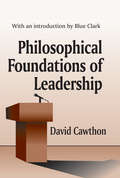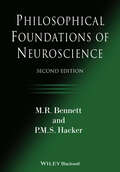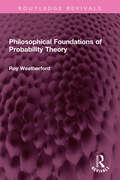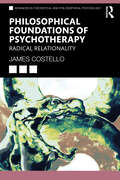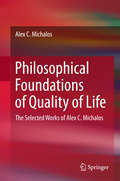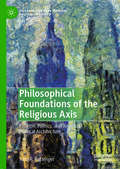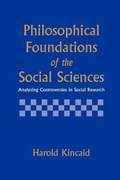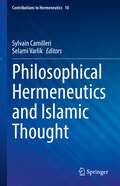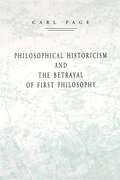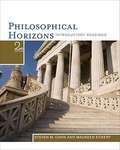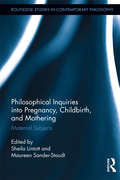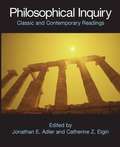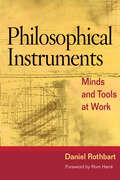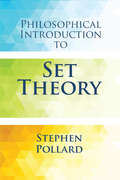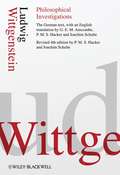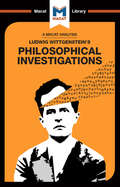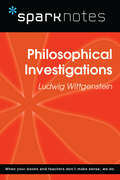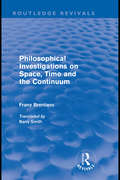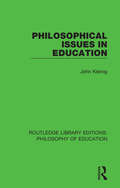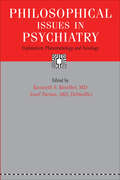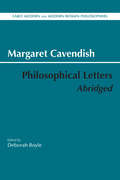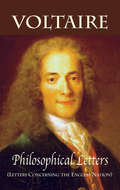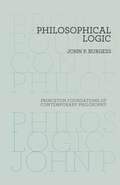- Table View
- List View
Philosophical Foundations of Leadership
by David CawthornThe nature of leadership and the human qualities that promote or inhibit it have a long history in Western thought and remain a central concern in modern societies. Crises in leadership may arise from either human failings or social complexities that defeat or reject those most qualified to lead. While most contemporary political or social commentators on such crises tend to focus on external circumstances, David Cawthon examines classical thinkers from Plato to Nietzsche to offer a historical and philosophical perspective on the intrinsic qualities of leadership and how these qualities are coded into the souls of some, but not of others.
Philosophical Foundations of Neuroscience
by P. M. Hacker M. R. BennettThe second edition of the seminal work in the field—revised, updated, and extended In Philosophical Foundations of Neuroscience, M.R. Bennett and P.M.S. Hacker outline and address the conceptual confusions encountered in various neuroscientific and psychological theories. The result of a collaboration between an esteemed philosopher and a distinguished neuroscientist, this remarkable volume presents an interdisciplinary critique of many of the neuroscientific and psychological foundations of modern cognitive neuroscience. The authors point out conceptual entanglements in a broad range of major neuroscientific and psychological theories—including those of such neuroscientists as Blakemore, Crick, Damasio, Dehaene, Edelman, Gazzaniga, Kandel, Kosslyn, LeDoux, Libet, Penrose, Posner, Raichle and Tononi, as well as psychologists such as Baar, Frith, Glynn, Gregory, William James, Weiskrantz, and biologists such as Dawkins, Humphreys, and Young. Confusions arising from the work of philosophers such as Dennett, Chalmers, Churchland, Nagel and Searle are subjected to detailed criticism. These criticisms are complemented by constructive analyses of the major cognitive, cogitative, emotional and volitional attributes that lie at the heart of cognitive neuroscientific research. Now in its second edition, this groundbreaking work has been exhaustively revised and updated to address current issues and critiques. New discussions offer insight into functional magnetic resonance imaging (fMRI), the notions of information and representation, conflict monitoring and the executive, minimal states of consciousness, integrated information theory and global workspace theory. The authors also reply to criticisms of the fundamental arguments posed in the first edition, defending their conclusions regarding mereological fallacy, the necessity of distinguishing between empirical and conceptual questions, the mind-body problem, and more. Essential as both a comprehensive reference work and as an up-to-date critical review of cognitive neuroscience, this landmark volume: Provides a scientifically and philosophically informed survey of the conceptual problems in a wide variety of neuroscientific theories Offers a clear and accessible presentation of the subject, minimizing the use of complex philosophical and scientific jargon Discusses how the ways the brain relates to the mind affect the intelligibility of neuroscientific research Includes fresh insights on mind-body and mind-brain relations, and on the relation between the notion of person and human being Features more than 100 new pages and a wealth of additional diagrams, charts, and tables Continuing to challenge and educate readers like no other book on the subject, the second edition of Philosophical Foundations of Neuroscience is required reading not only for neuroscientists, psychologists, and philosophers, but also for academics, researchers, and students involved in the study of the mind and consciousness.
Philosophical Foundations of Probability Theory (Routledge Revivals)
by Roy WeatherfordFirst published in 1982, Philosophical Foundations of Probability Theory starts with the uses we make of the concept in everyday life and then examines the rival theories that seek to account for these applications. It offers a critical exposition of the major philosophical theories of probability, with special attention given to the metaphysical and epistemological assumptions and implications of each. The Classical Theory suggests probability is simply the ratio of favorable cases to all equi-possible cases: it is this theory that is relied on by gamblers and by most non-specialists. The A Priori Theory, on the other hand, describes probability as a logical relation between statements based on evidence. The Relative Frequency theories locate it not in logic but among empirical rates of occurrence in the real world, while the Subjectivist Theory identifies probability with the degree of a person’s belief in a proposition. Each of these types of theory is examined in turn, and the treatment is unified by the use of running examples and parallel analyses of each theory. The final chapter includes a summary and the author’s conclusions. This book is an essential read for scholars and researchers of Philosophy.
Philosophical Foundations of Psychotherapy: Radical Relationality (Advances in Theoretical and Philosophical Psychology)
by James CostelloPhilosophical Foundations of Psychotherapy promotes a critical understanding of the ideas, traditions, values, and principles that inform and shape – for better or for worse – what therapists do.The book challenges the unhelpful misconception that philosophy is for philosophers alone, because human reality is too complex for therapists to be unaware of the foundations, difficulties, and contradictions within our value systems, ethics, and assumptions. By retrieving attitudes from other times and other places, traversing the relational contours of history right up to contemporary thinkers and practitioners, the author argues that not only do relationships heal, but they offer the only safe harbour in life’s sea of troubles. He promotes a conscientious radical relationality, which remains attentive to its influences, including contemporary debates about our neoliberal selves, the superstructures of culture, and the ethics of authenticity. In stepping back from the sometimes- narrow concerns of our therapeutic methods, the book explores broader themes important for living well: what is the good of therapy, how do we reconcile our sense of futility in the face of an indifferent universe, postcolonial debates, responses to disembodied artificial intelligence, and alternatives to our human- centred stance towards Nature.This book is primarily for practitioners, trainees, and educators, but ultimately it is intended for the greater good of clients and those interested in what therapeutic practices and practitioners have to offer. It will also be useful for those teaching research methods, the practice of research supervision, reflexivity, and personal development, across all areas related to mental health.
Philosophical Foundations of Quality of Life
by Alex C. MichalosThis first volume has as its main focus the philosophical foundations of Michalos' work and describes it in the broad context of the study of logic, the philosophy of social sciences, and a general theory of value. After distinguishing things that have value from the value that things might have, it describes the foundations of a pragmatic theory of value. This theory plays a key role in the author's research on the quality of life and connects his empirical research to the philosophical tradition of the American pragmatists William James, Ralph Barton Perry, John Dewey and Clarence Irving Lewis. The volume addresses various aspects and issues concerning decision making, including decision procedures used in committees, used for assessing the acceptability of scientific theories and new technologies, procedures for a science court, ethical issues involved in the formation of beliefs, some limitations of classical economists' alleged postulates of rational preference, and the importance of analytic guides to decision making. Finally, it describes the organization of the Social Sciences Federation of Canada and a formal accounting system for scientific research.
Philosophical Foundations of the Religious Axis: Religion, Politics, and American Political Architecture (Palgrave Studies in Religion, Politics, and Policy)
by John R. PottengerThis book discusses the evolution of three philosophical foundations from the twelfth through the eighteenth centuries that converged to form the basis of liberal democracy’s approach to the place and role of religion in society and politics. Identified by the author as a “religious axis,” the period of convergence promoted rational and empirical investigation, enabled the development of diverse religious beliefs, and affirmed religious liberty and expressions amidst pluralist politics. The author shows that the religious axis’ three philosophical foundations—epistemic, axiological, and political—undergird the political architecture of American liberal democracy that designed a containment structure to protect a vast array of religious expressions and encourage their presence in the public square. Moreover, the structure embodied a democratic ethos that drives religious and political pluralism—but within limits. The author argues that this containment structure has paradoxically ignited frenzied fires of faith that politically threaten the structure’s own limits.
Philosophical Foundations of the Social Sciences
by Harold KincaidThis book defends the prospects for a science of society. It argues that behind the diverse methods of the natural sciences lies a common core of scientific rationality that the social sciences can and sometimes do achieve. It also argues that good social science must be in part about large-scale social structures and processes and thus that methodological individualism is misguided. These theses are supported by a detailed discussion of actual social research, including theories of agrarian revolution, organizational ecology, social theories of depression, and supply-demand explanations in economics.
Philosophical Hermeneutics and Islamic Thought (Contributions to Hermeneutics #10)
by Sylvain Camilleri Selami VarlikThis book investigates the methodological issues raised by the encounter between Islamic thought and contemporary philosophical hermeneutics. It features essays that examine why and how current Muslim thinkers refer to Continental philosophy. The contributors put the universality of the hermeneutic order to the test with three different approaches. The first looks at exegetical aspects. It addresses contemporary thinkers from the Islamicate world who have engaged critically or not with main representatives or key concepts of philosophical hermeneutics. The second presents an interpretative analysis. The essays here present attempts at using philosophical hermeneutics in order to develop new interpretations of canonical or traditional ensembles of texts such as the Qur’an and the Hadith as well as legal, spiritual, and philosophical corpuses from the Islamicate world. The third looks at different political and critical issues. The clear and sound reference to religion of Islamic thought makes its entanglement with philosophical hermeneutics a burning challenge for all parties involved. Is it true, as some contend, that philosophical hermeneutics can help interpret Islamic thought anew? This book reveals how the two philosophies are likely to expand each other’s horizons and influence each other’s conceptual frameworks. It features revised papers from an International Conference.
Philosophical Historicism and the Betrayal of First Philosophy
by Carl PageThe recent emergence, among philosophers, of the view that the activity of human reason in all its possible modes must also be historicized, including the activity of philosophizing itself, may be found in writers as diverse as Hans-Georg Gadamer, Richard Rorty, Michel Foucault, and Alasdair MacIntyre. This contemporary view of human reason contrasts with the traditional commitments of "First Philosophy," Aristotle's name for the knowledge of things through their ultimate causes and principles. This book challenges the prevailing historicist orthodoxies about the nature of reason and philosophy and offers the first comprehensive analysis and critique of historicism in its current philosophical form. Can philosophical historicism reasonably justify the interpretation of human reason on which its own objections to First Philosophy are based? While Carl Page ultimately concludes that it cannot, he also seeks to rehabilitate historicism's motivating insights by showing how they derive from questions Hegel and Heidegger raised about reason's relation to history.
Philosophical Historicism and the Betrayal of First Philosophy (G - Reference, Information and Interdisciplinary Subjects)
by Carl PageThe recent emergence, among philosophers, of the view that the activity of human reason in all its possible modes must also be historicized, including the activity of philosophizing itself, may be found in writers as diverse as Hans-Georg Gadamer, Richard Rorty, Michel Foucault, and Alasdair MacIntyre. This contemporary view of human reason contrasts with the traditional commitments of "First Philosophy," Aristotle's name for the knowledge of things through their ultimate causes and principles. This book challenges the prevailing historicist orthodoxies about the nature of reason and philosophy and offers the first comprehensive analysis and critique of historicism in its current philosophical form. Can philosophical historicism reasonably justify the interpretation of human reason on which its own objections to First Philosophy are based? While Carl Page ultimately concludes that it cannot, he also seeks to rehabilitate historicism's motivating insights by showing how they derive from questions Hegel and Heidegger raised about reason's relation to history.
Philosophical Horizons: Introductory Readings
by Steven M. Cahn Maureen EckertExplores the central issues of philosophy through an engaging combination of classic and contemporary sources. With over seventy non-technical readings, the editors of PHILOSOPHICAL HORIZONS have put together the easiest to follow and yet most informative philosophy selections ever. Unlike any other introductory anthology, you can read fully annotated masterpieces from the history of philosophy in their entirety, including Plato's Euthyphro, Apology, and Crito, the Encheiridion of Epictetus, Descartes's Meditations, Berkeley's Treatise, Hume's An Enquiry Concerning Human Understanding and Dialogues Concerning Natural Religion, Kant's Groundwork, Mill's Utilitarianism, James's The Will to Believe, and Sartre's The Humanism of Existentialism. These are juxtaposed with related work from contemporary philosophers so that you can experience how the issues raised in these classic works of philosophy are debated in contemporary times.
Philosophical Imagination and Cultural Memory: Appropriating Historical Traditions
by Patricia CookDoes philosophy have a future? Postmodern thought, with its rejection of claims to absolute truth or moral objectivity, would seem to put the philosophical enterprise in jeopardy. In this volume some of today's most influential thinkers face the question of philosophy's future and find an answer in its past. Their efforts show how historical traditions are currently being appropriated by philosophy, how some of the most provocative questions confronted by philosophers are given their impetus and direction by cultural memory.Unlike analytic philosophy, a discipline supposedly liberated from any manifestation of cultural memory, the movement represented by these essays demonstrates how the inquiries, narratives, traditions, and events of our cultural past can mediate some of the most interesting exercises of the present-day philosophical imagination. Attesting to the power of historical tradition to enhance and redirect the prospects of philosophy these essays exemplify a new mode of doing philosophy. The product of a National Endowment for the Humanities Summer Institute in 1990, it is the task of this book to show that history can be reclaimed by philosophy and resurrected in postmodernity.Contributors. George Allan, Eva T. H. Brann, Arthur C. Danto, Lynn S. Joy, George L. Kline, George R. Lucas, Jr., Alasdair MacIntyre, Robert C. Neville, John Rickard, Stanley Rosen, J. B. Scheenwind, Donald Phillip Verene
Philosophical Inquiries into Pregnancy, Childbirth, and Mothering: Maternal Subjects (Routledge Studies in Contemporary Philosophy)
by Sheila Lintott Maureen Sander–StaudtPhilosophical inquiry into pregnancy, childbirth, and mothering is a growing area of interest to academic philosophers. This volume brings together a diverse group of philosophers to speak about topics in this reemerging area of philosophical inquiry, taking up new themes, such as maternal aesthetics, and pursuing old ones in new ways, such as investigating stepmothering as it might inform and ground an ethics of care. The theoretical foci of the book include feminist, existential, ethical, aesthetic, phenomenological, social and political theories. These perspectives are then employed to consider many dimensions of pregnancy, childbirth, and mothering, which are of central importance to human existence, but are only rarely discussed in philosophical cannons. Topics include pregnancy and embodiment, breast-feeding, representations – or the lack thereof – of pregnant and birthing women, adoption, and post-partum motherhood.
Philosophical Inquiry: Classic and Contemporary Readings
by Jonathan E. Adler Catherine Z. ElginThis meticulously edited anthology provides a comprehensive, problems-oriented entree to philosophy. Substantial readings from major classical and contemporary thinkers--featuring many of Hackett's widely acclaimed translations--are supported by a general introduction, engaging introductions to each major topic, and a glossary of important philosophical terms.
Philosophical Instruments: Minds and Tools at Work
by Daniel RothbartThe surprising roles of instruments and experimentation in acquiring knowledge In Philosophical Instruments Daniel Rothbart argues that our tools are not just neutral intermediaries between humans and the natural world, but are devices that demand new ideas about reality. Just as a hunter's new spear can change their knowledge of the environment, so can the development of modern scientific equipment alter our view of the world. Working at the intersections of science, technology, and philosophy, Rothbart examines the revolution in knowledge brought on by recent advances in scientific instruments. Full of examples from historical and contemporary science, including electron scanning microscopes, sixteenth-century philosophical instruments, and diffraction devices used by biochemical researchers, Rothbart explores the ways in which instrumentation advances a philosophical stance about an instrument's power, an experimenter's skills, and a specimen's properties. Through a close reading of engineering of instruments, he introduces a philosophy from (rather than of) design, contending that philosophical ideas are channeled from design plans to models and from model into the use of the devices.
Philosophical Introduction to Set Theory (Dover Books on Mathematics)
by Stephen PollardThe primary mechanism for ideological and theoretical unification in modern mathematics, set theory forms an essential element of any comprehensive treatment of the philosophy of mathematics. This unique approach to set theory offers a technically informed discussion that covers a variety of philosophical issues. Rather than focusing on intuitionist and constructive alternatives to the Cantorian/Zermelian tradition, the author examines the two most important aspects of the current philosophy of mathematics, mathematical structuralism and mathematical applications of plural reference and plural quantification.Clearly written and frequently cited in the mathematical literature, this book is geared toward advanced undergraduates and graduate students of mathematics with some aptitude for mathematical reasoning and prior exposure to symbolic logic. Suitable as a source of supplementary readings in a course on set theory, it also functions as a primary text in a course on the philosophy of mathematics.
Philosophical Investigations
by Ludwig Wittgenstein P. M. S. Hacker Joachim Schulte G.E.M. AnscombeIncorporating significant editorial changes from earlier editions, the fourth edition of Ludwig Wittgenstein's Philosophical Investigations is the definitive en face German-English version of the most important work of 20th-century philosophy The extensively revised English translation incorporates many hundreds of changes to Anscombe's original translation.
Philosophical Investigations
by Michael O' SullivanMany still consider Ludwig Wittgenstein’s 1953 Philosophical Investigations to be one of the breakthrough works of twentieth-century philosophy. The book sets out a radically new conception of philosophy itself, and demonstrates all the attributes of a fine analytical mind. Taking an argument from Plato and subjecting it to detailed (and very clear) analysis, Wittgenstein shows his understanding of how the sequence and function of differing parts of a highly-complex argument can be broken down and assessed. In so doing, he reaches a logical position of simultaneous agreement and disagreement with Plato’s philosophical position. Philosophical Investigations is also a powerful example of the skill of interpretation. Philosophical problems often arise from confusions in the use of language – and the way to solve these problems, Wittgenstein posits, is by clarifying language use. He argues that philosophers must study ordinary uses of language and examine how people use it as a tool in their everyday lives. In this highly-interpretative way, the meaning of a word or sentence becomes relative to the context (people, culture, community) in which it is used. Rather than debate abstract problems, Wittgenstein urges philosophers to concern themselves with ordinary life and the concrete situations in which humans find themselves.
Philosophical Investigations (SparkNotes Philosophy Guide)
by SparkNotesPhilosophical Investigations (SparkNotes Philosophy Guide) Making the reading experience fun! SparkNotes Philosophy Guides are one-stop guides to the great works of philosophy–masterpieces that stand at the foundations of Western thought. Inside each Philosophy Guide you&’ll find insightful overviews of great philosophical works of the Western world.
Philosophical Investigations on Time, Space and the Continuum (Routledge Revivals)
by Franz BrentanoFranz Brentano is recognised as one of the most important philosophers of the late nineteenth and early twentieth centuries. This work, first published in English in 1988, besides being an important contribution to metaphysics in its own right, has considerable historical importance through its influence on Husserl’s views on internal time consciousness. The work is preceded by a long introduction by Stephan Körner in collaboration with Brentano’s literary executor.
Philosophical Issues in Education (Routledge Library Editions: Philosophy of Education #11)
by John KleinigThe philosophy of education is an important component of most education courses. The subject is often split into two traditions, one emphasising the use of analytic philosophy, the other engaging in radical social criticism. This book, first published in 1982, brings together the strengths of both traditions and takes stock of the debate. This study provides an interesting introduction to all the major philosophical issues in education which is different to many other works on the subject.
Philosophical Issues in Psychiatry: Explanation, Phenomenology, and Nosology (International Perspectives In Philosophy And Psychiatry Ser.)
by Kenneth S. Kendler Josef Parnas, M.D., Dr.Med.Sci.This multidisciplinary collection explores three key concepts underpinning psychiatry—explanation, phenomenology, and nosology—and their continuing relevance in an age of neuroimaging and genetic analysis.An introduction by Kenneth S. Kendler lays out the philosophical grounding of psychiatric practice. The first section addresses the concept of explanation, from the difficulties in describing complex behavior to the categorization of psychological and biological causality. In the second section, contributors discuss experience, including the complex and vexing issue of how self-agency and free will affect mental health. The third and final section examines the organizational difficulties in psychiatric nosology and the instability of the existing diagnostic system. Each chapter has both an introduction by the editors and a concluding comment by another of the book’s contributors.Contributors: John Campbell, Ph.D.; Thomas Fuchs, M.D., Ph.D.; Shaun Gallagher, Ph.D.; Kenneth S. Kendler, M.D.; Sandra D. Mitchell, Ph.D.; Dominic P. Murphy, Ph.D.; Josef Parnas, M.D., Dr.Med.Sci.; Louis A. Sass, Ph.D.; Kenneth F. Schaffner, M.D., Ph.D.; James F. Woodward, Ph.D.; Peter Zachar, Ph.D.
Philosophical Letters, Abridged (Early Modern and Modern Women Philosophers)
by Margaret Cavendish"Margaret Cavendish (1623–1673) is a fascinating figure who is getting increasing attention by historians of philosophy these days, and for good reason. . . . She&’s an interesting advocate of a vitalist tradition emphasizing the inherent activity of matter, as well as its inherent perceptive faculties. She&’s also the perfect character to open students (and their teachers) up to a different seventeenth century, and a different cast of philosophical characters. This is an ideal book to use in the classroom. The Philosophical Letters (1664) gives us Cavendish&’s view of what was interesting and important in the philosophical world at that moment, a view of philosophy as it was at the time by an engaged participant. There are few documents like it in the history of philosophy. Deborah Boyle&’s Introduction provides a very accessible summary of Cavendish&’s natural philosophy, as well as good introductions to the other figures that Cavendish discusses in the book. Boyle&’s annotations are not extensive, but they are a great help in guiding the student toward an informed reading of the texts." —Daniel Garber, Princeton University
Philosophical Letters: Letters Concerning the English Nation (Thrift Edition Ser.)
by VoltaireBest known for his philosophical novel Candide, Voltaire ranked among the leading intellectuals of the Enlightenment period. His two-and-a-half-year sojourn in England left a profound impression, and these letters—written as though explaining English society to a French friend—focus on the country's religion and politics, with commentaries on Quakers, the Church of England, Presbyterians, Anti-Trinitarians, Parliament, the government, and commerce. They also include essays on Locke, Descartes, and Newton. Voltaire was much influenced by English tolerance, and his observations on the subject sounded a revolutionary note among European readers that resonated for long afterward. First published in English in 1733, Philosophical Letters was condemned by the French government as "likely to inspire a license of thought most dangerous to religion and civil order." It remains a landmark of the Age of Reason.
Philosophical Logic (Princeton Foundations of Contemporary Philosophy #6)
by John P. BurgessA brief account of philosophical logic from one of the world's leading authoritiesPhilosophical Logic is a clear and concise critical survey of nonclassical logics of philosophical interest written by one of the world's leading authorities on the subject. After giving an overview of classical logic, John Burgess introduces five central branches of nonclassical logic (temporal, modal, conditional, relevantistic, and intuitionistic), focusing on the sometimes problematic relationship between formal apparatus and intuitive motivation. Requiring minimal background and arranged to make the more technical material optional, the book offers a choice between an overview and in-depth study, and it balances the philosophical and technical aspects of the subject.The book emphasizes the relationship between models and the traditional goal of logic, the evaluation of arguments, and critically examines apparatus and assumptions that often are taken for granted. Philosophical Logic provides an unusually thorough treatment of conditional logic, unifying probabilistic and model-theoretic approaches. It underscores the variety of approaches that have been taken to relevantistic and related logics, and it stresses the problem of connecting formal systems to the motivating ideas behind intuitionistic mathematics. Each chapter ends with a brief guide to further reading.Philosophical Logic addresses students new to logic, philosophers working in other areas, and specialists in logic, providing both a sophisticated introduction and a new synthesis.
